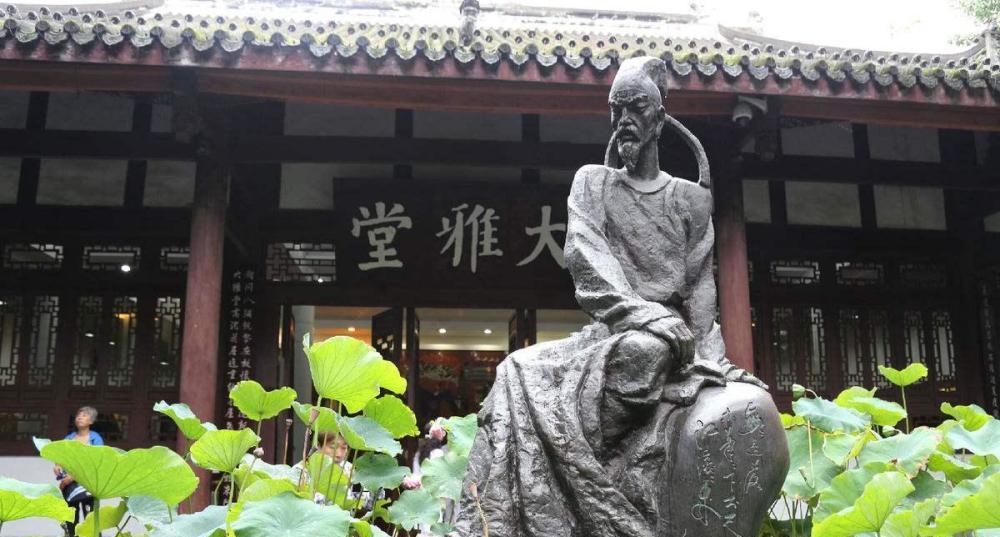Zhuge Liang was a famous military, literary, politician, and thinker; his life can be described as vigorous, when Liu Beisan took care of Maolu, he knew the three divisions of the world before he went out of the mountains, and later made great achievements and achieved a great cause; and both his character and historical merits were talked about by posterity. However, among the many evaluations, the Sheng Tang poet Du Fu was the most accurate, and wrote many poems to evaluate Zhuge Liang, especially this "Shu Xiang", which was written very touchingly throughout, not only fully affirming Zhuge Liang's merits, but also expressing admiration. It can be seen that in Du Fu's mind, Zhuge Liang is an example for him to learn.

As a famous poet in the prosperous Tang Dynasty, Du Fu wrote many famous passages that have flowed through the ages, and his talent and character are also unmatched. Although he is not satisfied with everything in his life and lives a life of upheaval and displacement, he always cares about the world and cares about the people at the bottom. It is precisely for this reason that he has the reputation of "poetic saint" and is also admired by posterity.
That "Shu Xiang" throughout the emotional delicate, when Du Fu was visiting the Chengdu Xiang Ancestral Hall, so there was a sense of hair, wrote such a classic, it is to tell the world, Zhuge Liang's life achievements and fame, although the personality is noble, but the later period still failed, and finally failed to achieve the ideal of life, which also became a regret in his life, so Du Fu in the last two sentences, wrote very sadly, "before the master died, the hero was full of tears." These two sentences can be said to have written the regrets of Zhuge Liang's life.
《Shu Xiang》
Tang Dynasty: Du Fu
Where to find the ancestral hall of the Prime Minister, Outside the Jinguan City, Persensen.
The green grass of the ying order is self-colored, and the yellow orioles in the next leaf are empty and good.
The three Gu frequently annoyed the world's plans, and the two dynasties opened the hearts of the old ministers.
He died before he could get out of the division, and the hero was in tears.
Du Fu's poem was written in December 759 (the second year of Emperor Qianyuan of Tang Suzong), when he had just arrived in Chengdu, ending his turbulent and displaced life and settling down slightly. Local friends paid for him to build a grass hall, finally lived in Chengdu, at this time Du Fu although his life was stable, but his heart is still sad, which is why when he visited the Ancestral Hall, in a very sad tone, he wrote down his admiration for Zhuge Liang, detailing his life's work, so such a poem for Zhuge Liang's evaluation is the most accurate, a few short sentences, can be described as a needle.
Shou Lian and Jaw Lian first wrote about the place where the Ancestral Hall was located and the beautiful scenery there, so that together they wrote, they also made this poem more poetic; then these few sentences are also easier to understand, which roughly means, where are we going to find Zhuge Liang's ancestral hall now? In fact, it is not far from here, only in the place of Gubsensen on the outskirts of Chengdu, where the trees are dense. The green grass is reflected in front of the steps, making the place very quiet, and the yellow oriole birds on the branches are chirping, and the song is very crisp and pleasant to listen to. These few sentences do not focus on Zhuge Liang's merits, but only explain the location of the Ancestral Hall.
The last few sentences of the neck link and the tail link are focused on the merits of Zhuge Liang, which also points out the theme, and also makes these poems more infectious; when Liu Beisan Gu Maolu invited him to go out of the mountain and talk about the world's major events together, and at this time he knew that the future would be divided into three worlds, and later he assisted two generations of monarchs, and he was really loyal. The last two sentences are written about the pain in Zhuge Liang's life, but it is a pity that the teacher did not die before he died, and finally did not realize the ideal of life, which also became a regret in his life, and the heroes of all generations are like this, and can only feel the tears for the hero.
Many of Du Fu's poems are delicate in emotion, and they are also extremely tragic, in this "Shu Xiang", he wrote down Zhuge Liang's life in a very sad tone, although only so short a few sentences, but each sentence is a classic, but also let us feel the poet's admiration for Zhuge Liang, as well as the evaluation of that period of history, which is the most unique place of this poem.